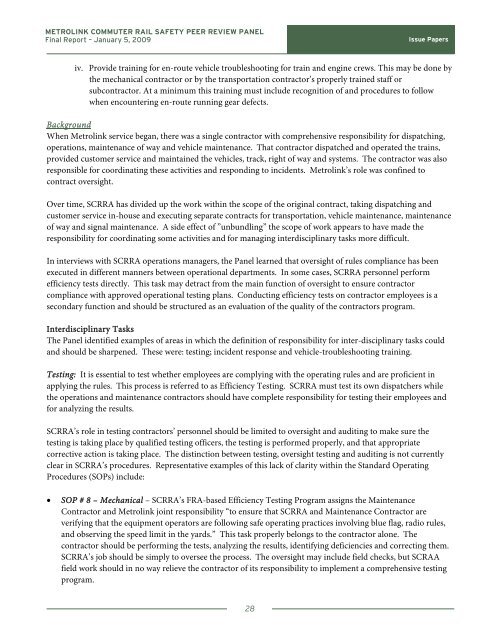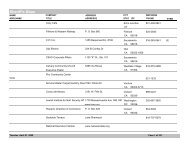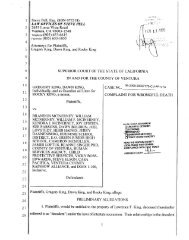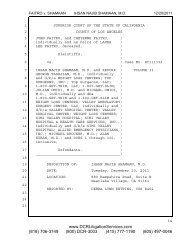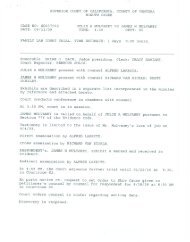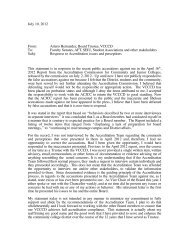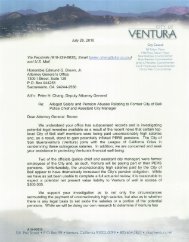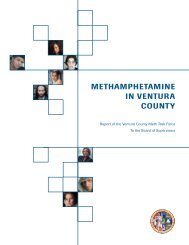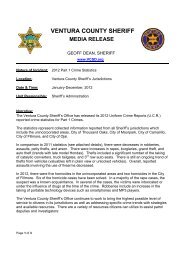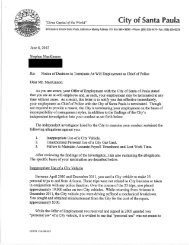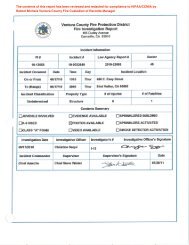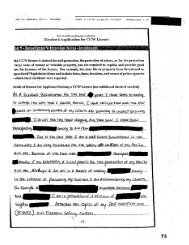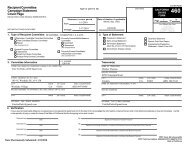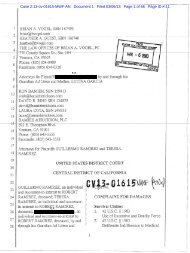Metrolink peer review report - Ventura County Star
Metrolink peer review report - Ventura County Star
Metrolink peer review report - Ventura County Star
You also want an ePaper? Increase the reach of your titles
YUMPU automatically turns print PDFs into web optimized ePapers that Google loves.
METROLINK COMMUTER RAIL SAFETY PEER REVIEW PANEL<br />
Final Report – January 5, 2009<br />
Issue Papers<br />
iv. Provide training for en-route vehicle troubleshooting for train and engine crews. This may be done by<br />
the mechanical contractor or by the transportation contractor’s properly trained staff or<br />
subcontractor. At a minimum this training must include recognition of and procedures to follow<br />
when encountering en-route running gear defects.<br />
Background<br />
When <strong>Metrolink</strong> service began, there was a single contractor with comprehensive responsibility for dispatching,<br />
operations, maintenance of way and vehicle maintenance. That contractor dispatched and operated the trains,<br />
provided customer service and maintained the vehicles, track, right of way and systems. The contractor was also<br />
responsible for coordinating these activities and responding to incidents. <strong>Metrolink</strong>’s role was confined to<br />
contract oversight.<br />
Over time, SCRRA has divided up the work within the scope of the original contract, taking dispatching and<br />
customer service in-house and executing separate contracts for transportation, vehicle maintenance, maintenance<br />
of way and signal maintenance. A side effect of ”unbundling” the scope of work appears to have made the<br />
responsibility for coordinating some activities and for managing interdisciplinary tasks more difficult.<br />
In interviews with SCRRA operations managers, the Panel learned that oversight of rules compliance has been<br />
executed in different manners between operational departments. In some cases, SCRRA personnel perform<br />
efficiency tests directly. This task may detract from the main function of oversight to ensure contractor<br />
compliance with approved operational testing plans. Conducting efficiency tests on contractor employees is a<br />
secondary function and should be structured as an evaluation of the quality of the contractors program.<br />
Interdisciplinary Tasks<br />
The Panel identified examples of areas in which the definition of responsibility for inter-disciplinary tasks could<br />
and should be sharpened. These were: testing; incident response and vehicle-troubleshooting training.<br />
Testing: It is essential to test whether employees are complying with the operating rules and are proficient in<br />
applying the rules. This process is referred to as Efficiency Testing. SCRRA must test its own dispatchers while<br />
the operations and maintenance contractors should have complete responsibility for testing their employees and<br />
for analyzing the results.<br />
SCRRA’s role in testing contractors’ personnel should be limited to oversight and auditing to make sure the<br />
testing is taking place by qualified testing officers, the testing is performed properly, and that appropriate<br />
corrective action is taking place. The distinction between testing, oversight testing and auditing is not currently<br />
clear in SCRRA’s procedures. Representative examples of this lack of clarity within the Standard Operating<br />
Procedures (SOPs) include:<br />
• SOP # 8 – Mechanical – SCRRA’s FRA-based Efficiency Testing Program assigns the Maintenance<br />
Contractor and <strong>Metrolink</strong> joint responsibility “to ensure that SCRRA and Maintenance Contractor are<br />
verifying that the equipment operators are following safe operating practices involving blue flag, radio rules,<br />
and observing the speed limit in the yards.” This task properly belongs to the contractor alone. The<br />
contractor should be performing the tests, analyzing the results, identifying deficiencies and correcting them.<br />
SCRRA’s job should be simply to oversee the process. The oversight may include field checks, but SCRAA<br />
field work should in no way relieve the contractor of its responsibility to implement a comprehensive testing<br />
program.<br />
28


